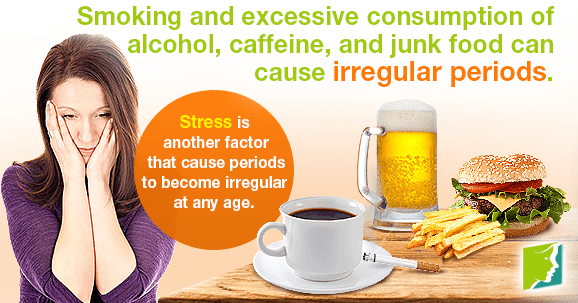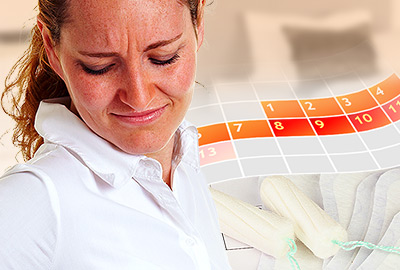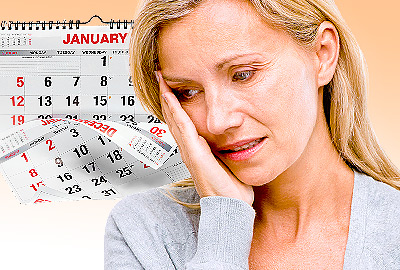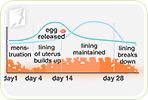Most women experience the frustration of menstrual irregularities at some point during their lives, whether this means unpredictable, sporadic periods, or heavy bleeding when periods do occur. The menstrual cycle is closely linked with a number of physical and emotional conditions in the body; for women over the age of 40, irregular periods are usually associated with menopause. However, for younger women, the cause can be difficult to determine. Keep reading to understand more what irregular periods might mean in women under 40, and discover ways of dealing with them.
What Is a Regular Period?
Menstruation is a natural process where the uterus wall lining is shed, resulting in bleeding known as a period. Periods begin around the early teenage years and continue through to menopause, around the age of 50. As a general rule, periods occur for between 3-5 days in a 28-day cycle, and anything that strays dramatically from this is considered irregular.
It should be noted that when a young woman first starts her periods, it may take several years for them to occur regularly; unless she notices other concerning symptoms, this is generally nothing to worry about.
Can Diet, Habits, and Lifestyle Influence Menstruation?
Quite simply, yes. If you are under the age of 40, assessing your lifestyle should be your first response to irregular periods. Habits such as smoking and excessive consumption of alcohol, caffeine, and junk food are detrimental to your overall health and can cause periods to become irregular. Similarly, extreme weight loss or gain can cause periods to become sporadic or stop altogether. A balanced diet with regular exercise will have a nurturing effect not just on your menstrual cycle, but also on your overall sense of well-being.
Stress is another factor that can cause periods to become irregular at any age. If you are going through a period of emotional distress or significant change, this may temporarily disrupt your menstrual cycle. If you are concerned that your stress levels are consistently high, you should consider arranging an appointment with your doctor to discuss your options.
Using an internal form of contraception could also interfere with your menstrual cycle. Contraceptives like the birth control pill and the contraceptive implant interfere with the hormone levels that drive the menstrual system and often cause periods to stop entirely. Condoms or diaphragms are alternative contraceptives that are not hormone-related.
Are My Irregular Periods Symptomizing Something More Serious?
Sometimes, irregular periods could be a symptom of other conditions, such as thyroid disorders, pregnancy, estrogen deficiencies, problems in the reproductive system, and some cancers. The key to determining whether your irregular periods are indicative of more serious health concerns is to look for other symptoms.
Unexplained weight gain or loss, inability to conceive, pain, unexplained hair growth, lactation, and any feelings of tiredness or weakness could be suggestive of more serious illness, and you should arrange a consultation with your doctor at the earliest opportunity.
Whatever your age, it is a good idea to keep an eye on your menstrual cycle and look out for troubling symptoms. Keeping a note of when your periods occur, their duration, and their heaviness can help with this, and this record will be useful should you decide to consult a doctor, if your other symptoms become concerning. Stay prepared for unexpected periods by carrying sanitary wear in your handbag so that you can tackle the symptom head-on and minimize its impact on your lifestyle.
Sources
- Better Health Channel. (2013). Menstruation: abnormal bleeding. Retrieved February 26, 2014, from http://www.betterhealth.vic.gov.au/bhcv2/bhcarticles.nsf/pages/Menstruation_abnormal_bleeding
- National Health Service U.K. (2013). Periods, Irregular - Causes. Retrieved: February 26, 2014, from http://www.nhs.uk/Conditions/Periods-irregular/Pages/Causes.aspx
- National Health Service U.K. (2013). Periods, Irregular - Treatment. Retrieved February 26, 2014 from http://www.nhs.uk/Conditions/Periods-irregular/Pages/Treatment.aspx
- National Institutes of Health. (2014). Menstruation. Retrieved February 26, 2014, from http://www.nlm.nih.gov/medlineplus/menstruation.html
- National Institutes of Health. (2011). Vaginal Bleeding. Retrieved February 26, 2014: http://www.nlm.nih.gov/medlineplus/ency/article/007496.htm




